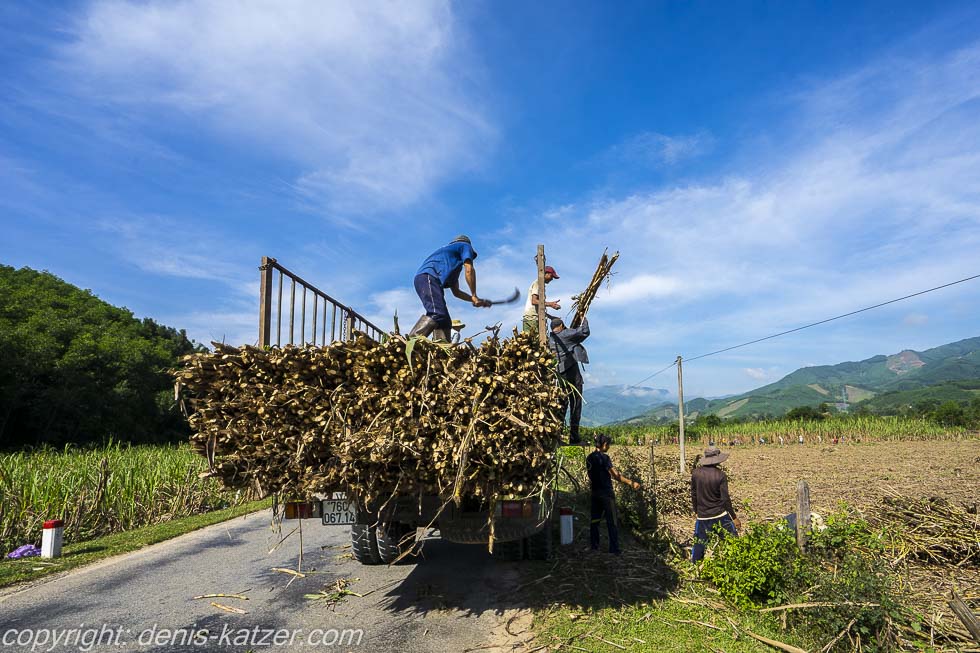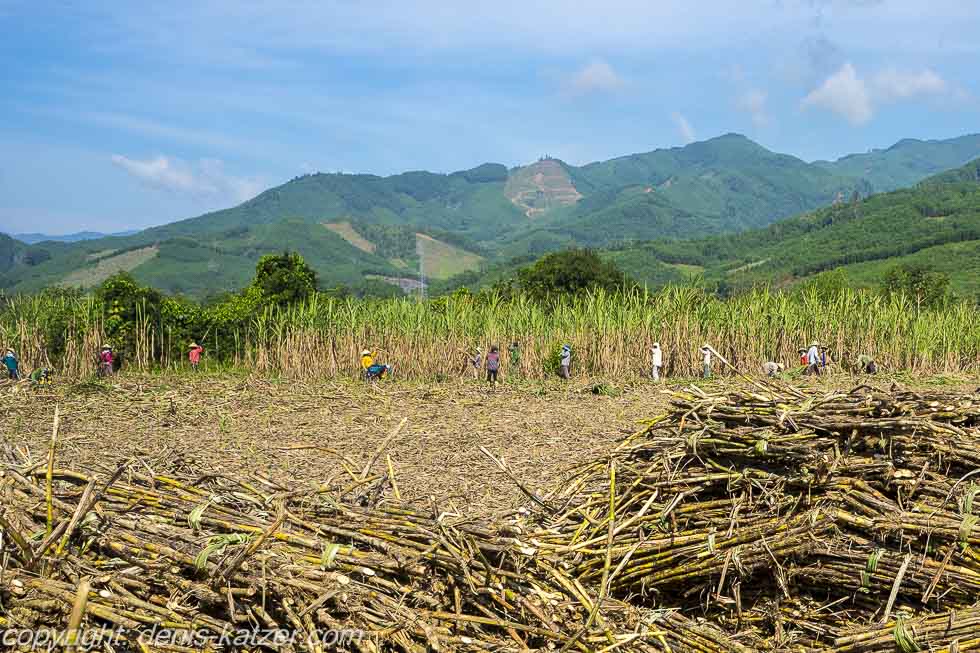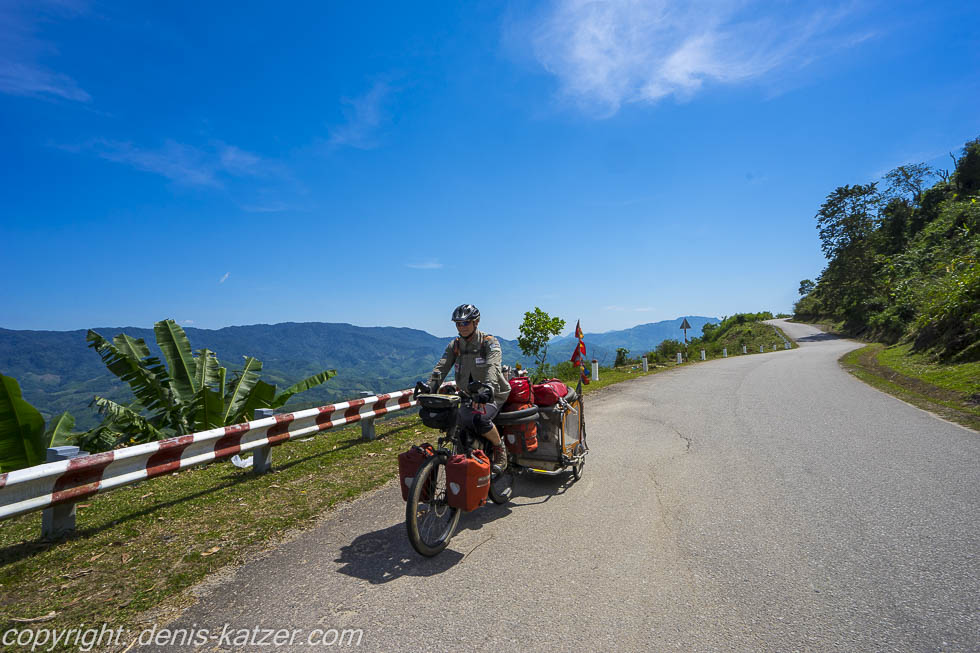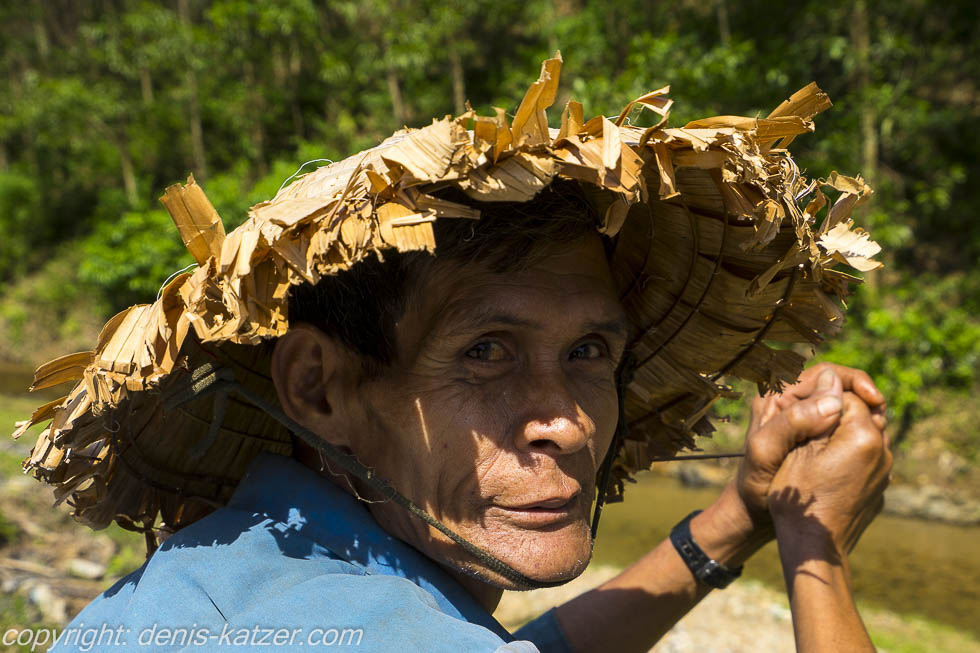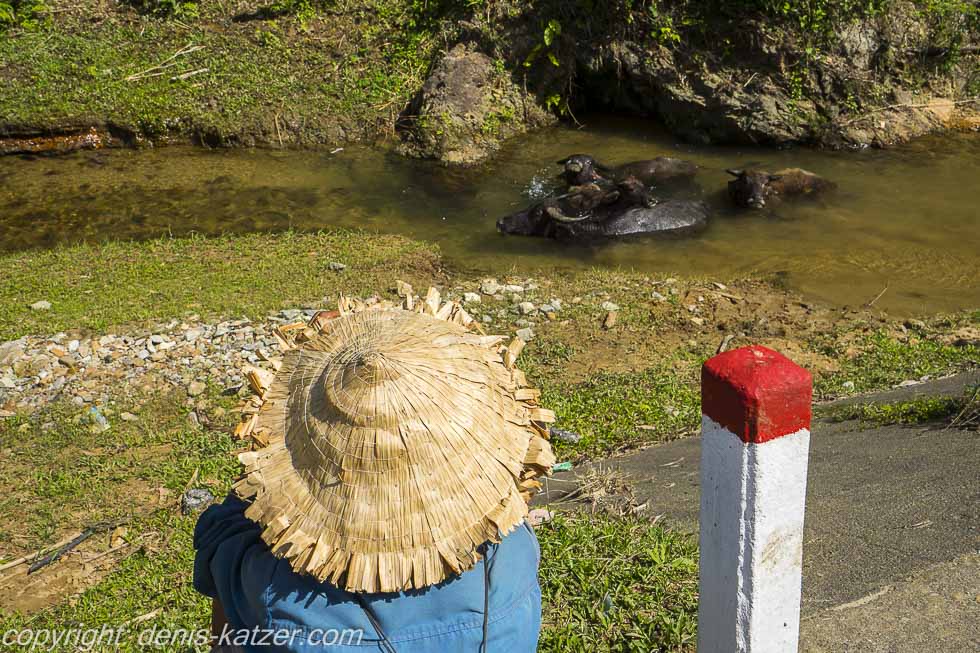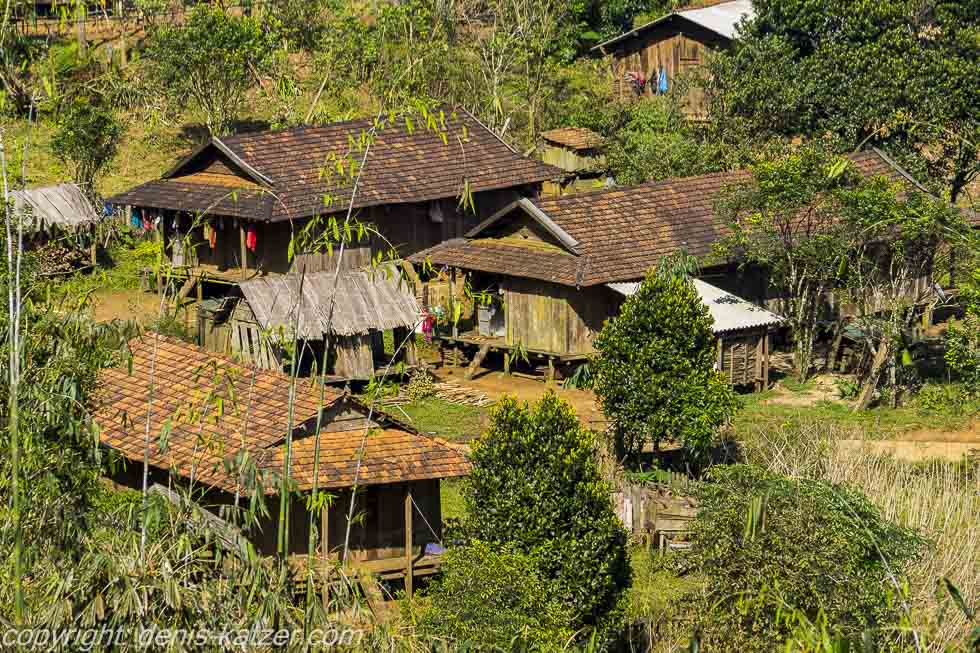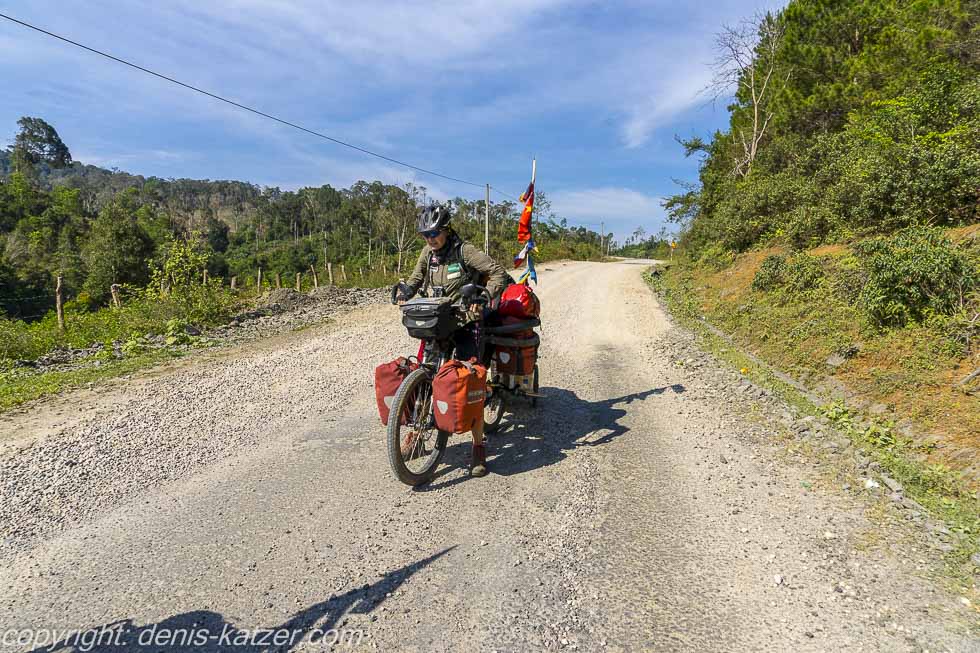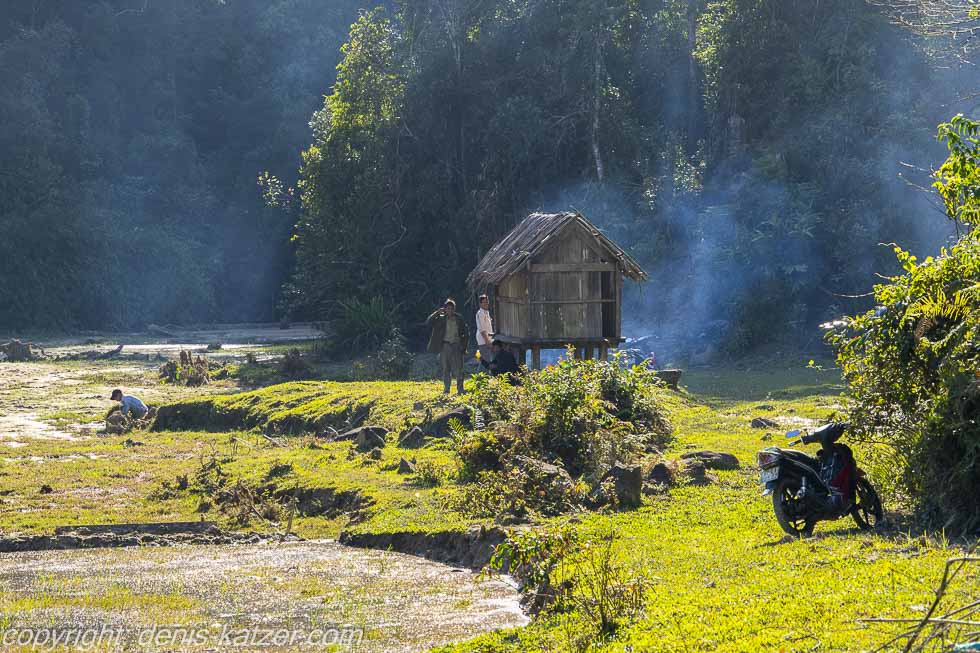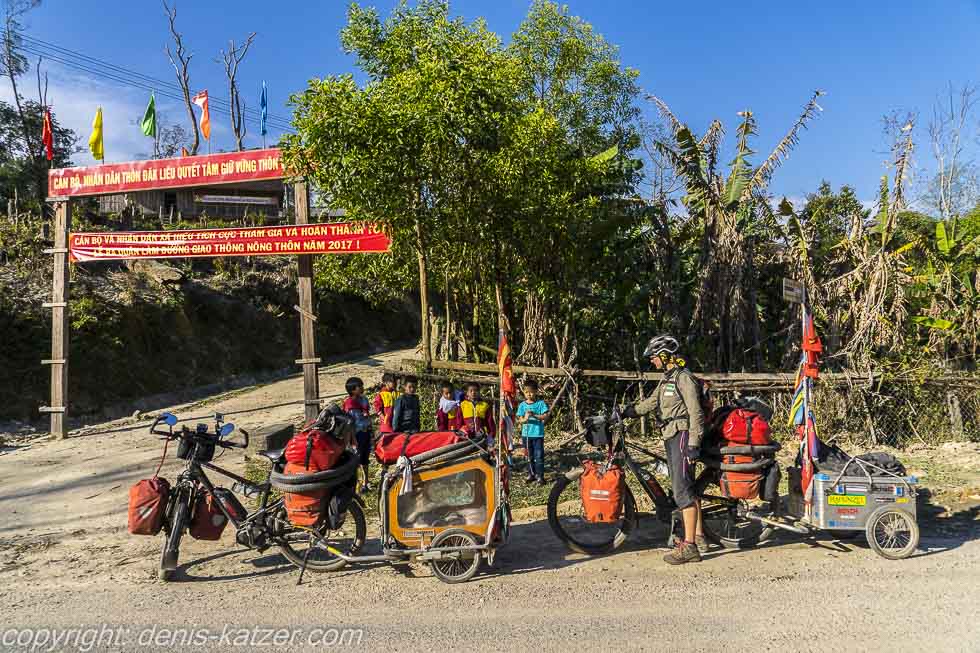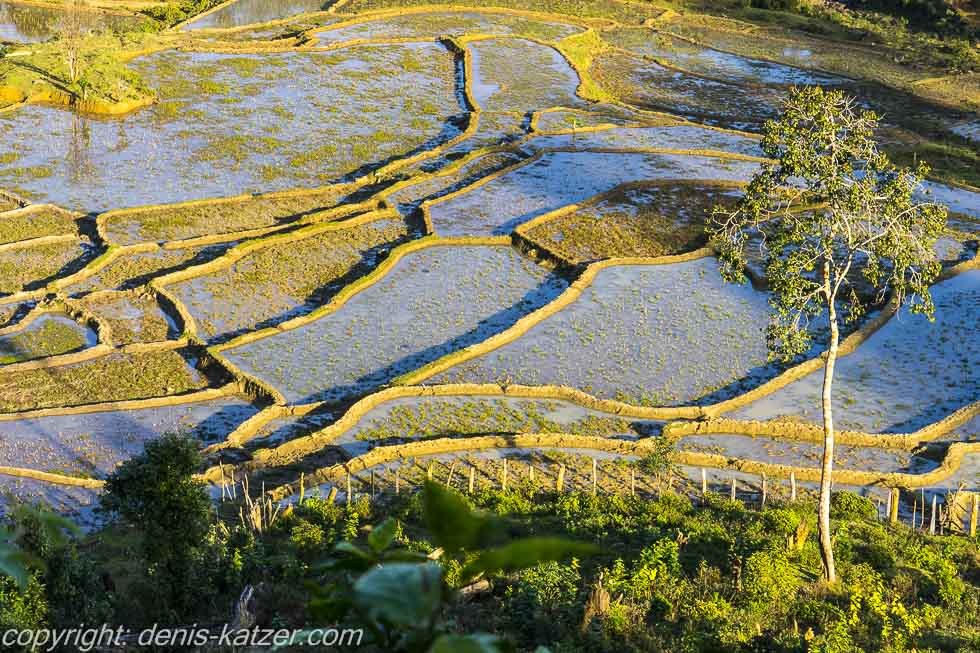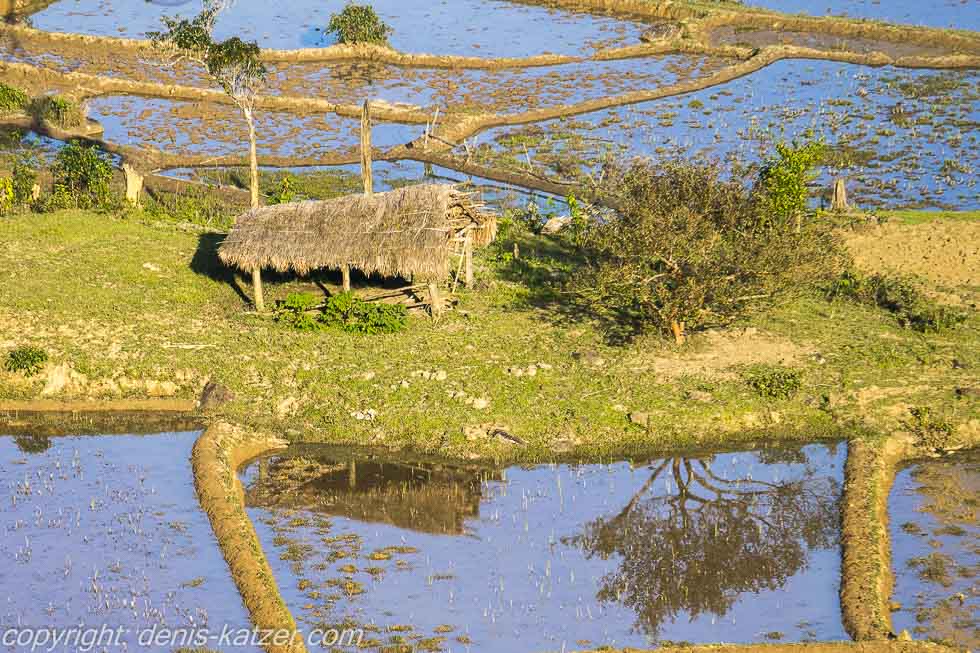
103 kilometers per day and 2,218 vertical meters
N 14°35'32.5'' E 108°17'06.3''
Date:
08.02.2017 until 09.02.2017
Day: 589 – 590
Country:
Vietnam
Province:
Con tum
Location:
Mang Deng
Latitude N:
14°35’32.5”
Longitude E:
108°17’06.3”
Daily kilometers:
103 km
Total kilometers:
21,941 km
As the crow flies:
52 km
Average speed:
15.6 km/h
Maximum speed:
44 km/h
Travel time:
6:37 hrs.
Soil condition:
Asphalt / gravel road
Maximum height:
1.300 m
Total altitude meters:
61.786 m
Altitude meters for the day:
2.218 m
Sunrise:
06:13 am
Sunset:
5:48 pm
Temperature day max:
25°C
Departure:
07:45 a.m.
Arrival time:
6:00 pm
(Photos of the diary entry can be found at the end of the text).
The disgruntled motel owner shows her true colors again in the morning. She suddenly wants 30,000 dong more than we agreed yesterday. “Why?” asks Tanja. “Your dog,” is her answer. “Our dog? Why should we suddenly have to pay for him?” replies Tanja. “If they don’t give me 30,000 dong more, I’ll keep their passports,” she threatens. “She won’t get a single extra dong,” I say, continuing to load our bikes. The woman now sends one of the few guests to us who tries to explain the owner’s point of view in poor English. “Tell the lady that she can’t just raise the prices afterwards. And please tell her to give us our passports back immediately,” Tanja replies in a friendly but firm manner. 10 minutes later we receive our important documents and pay the overnight price agreed yesterday. Fortunately, such unfair rip-off attempts are an absolute rarity in Vietnam. As a rule, people are honest, but unfortunately there are always exceptions.
We leave the small mountain village and the trouble with the dishonest motel owner behind us in perfect weather. We cross a bridge. A completely naked man comes towards us. A couple of policemen stop him to talk to him. In the pleasant morning temperatures, we glide over the asphalt strip, which is interrupted every few hundred meters by a carpet of holes. Farmers harvest sugar cane. Despite the hard work, they call out to us in a friendly manner. “Let’s have a phở (soup) there!” I shout and pull the brakes. The cook at the roadside stall shows us a seat at one of the plastic tables. “It looks clean,” says Tanja happily, because many of the small soup restaurants are often quite dirty. This is mostly because the Vietnamese have a different relationship to cleanliness. When the table is covered in leftover food from the previous guest and the floor is littered with cans and leftovers, the landlady comes along with an old cloth and rubs the whole mess away. Afterwards, the coarse food is off the table, but if you lean on it with your elbows, fat and sauce residue may well stick to your sleeve. However, the place is spotlessly clean and the landlady even rinses the cloth under running water after cleaning it. Hãy súp gà (chicken soup, please) I try my hand at Vietnamese. The landlady shakes her head. We understand that there is only phở bò (beef soup). Never mind, beef soup it is. We always believe the meat anyway and give it to Ajaci. I would actually like to eat something else in the morning, but in Vietnam, phở bò (beef soup) and phở gà (chicken soup) are as much a part of life as the air we breathe. In this country, soups are available around the clock on every corner. It tastes a little different everywhere. Usually quite tasty. The only serious disadvantage, however, is that hardly anyone here can cook without flavor enhancers. As soon as you say to the cooks: Xin vui lòng không làm tăng hương vị (please without flavor enhancers), most of them look at us in disbelief. It is not uncommon for us to be served a completely tasteless broth. For such cases, we carry our own salt to add at least a little spice to the soup. The landlady here surprises us. She explains that she always cooks without flavor enhancers because she is allergic to them. This means headaches and swelling in the face. “Delicious,” I praise, satisfied that this time I can satisfy my hunger without hesitation.
With a full stomach, we mount our steeds to cycle towards the dawning day. After about eight kilometers, I hear a loud “Stoooop!” “What’s wrong?” I ask, almost a little annoyed, because I’ve just really got into the swing of things. “The flagpole!” “What?” “The flagpole is gone.” “Oh no. That can’t be true. I left it with the disgruntled one,” I reply. We discuss for a few moments what we should do. “We’ll unload my bike and I’ll quickly jet back to get them,” I suggest. “No, I won’t let you drive back alone. You’ll end up jumping off a bamboo bridge again,” Tanja rejects my suggestion. “There was no bamboo bridge on this route at all,” I reply again with a laugh, but think back with horror to my accident when I broke my shoulder falling off the bamboo bridge in Mai Chau. “Okay, then we’ll drive back together,” I give in.
Back in the small town of Ba To, I park my road train in front of the motel and hurry inside. Hopefully it’s still there, I think, as the disgruntled woman is likely to have thrown it away or not given it back out of revenge because we didn’t pay the extra 30,000 dong she asked for. There is not a soul to be seen on the spacious first floor of the motel. I hurry to the place where I had loaded the bikes about an hour ago and lo and behold, the flagpole is still leaning against the wall where I put it this morning. I quickly grab it, run outside and hold it above my head like a trophy. Tanja grins. I put the pole on which all the flags of the countries I have traveled to on the bike are hanging back into the holder provided. It’s not just about a nice reminder of all the countries and experiences, but also about the colorful flags swaying back and forth in the wind to attract the attention of motorists.
24 km later, we pass the soup store waving happily. After 30 km, the road suddenly starts to climb. “I think the fun with the long descent is over now,” I realize during a short breather. “You mean we’re actually going over these mountains now?” asks Tanja, pointing to the mountain range in front of us. “Yes.” At this point, we don’t yet know what a huge barrier lies ahead of us. Fortunately. The sun burns unchecked from the firmament. Although the thermometer shows only 25 degrees in the shade and our drives are working perfectly, we start to sweat. We take one hairpin bend after another. The number 500 can be seen on the GPS display. This means that you have already climbed 450 meters to the top. Ridiculous, I think and let my legs gyrate. On and on and on. “Ajaci is thirsty!” shouts Tanja as we pant past a tiny waterfall. We are stopping. I fill the water bottles and let Ajaci drink the fresh mountain water. I hold my head under the cooling water to cool down a little. Moped riders speed past us. Is it still a long way to the top of the pass? “Ajaci into the box,” I order, whereupon he jumps into his trailer like a greased lightning bolt and lets Tanja strap him in, squealing with delight. “If it goes any higher, I’ll let it run again,” I think. “How high will it go up?” Tanja wants to know. “Well, 1,000 meters for sure.” “And how much have we already done?” “The GPS now shows 650 meters in altitude. Let’s go,” I say.
Hour after hour we pedal on. Stoically, like an ox turning the millstone, we let the wheels roll upwards. We have now reached 1,100 meters. A battery is empty every 9 km at the latest. “How many full batteries do we have left?” I ask, because I’ve got my calculations mixed up. “Two more.” “If it keeps going uphill like this, we’ll run out of energy again,” I reply, remembering the endless mountain rides in China, where we ran out of energy at the end of the day more than once. The landscape around us is sublime. Like an eagle, we sometimes think we are flying over the vast land when the runway passes close to the abyss. A herdsman sits by the roadside and supervises his water buffalo as they take a cooling dip in a pond. He looks at us with open laughter and marvels at our heavily laden bikes, but above all at Ajaci, who squeals loudly and asks me to take it up a notch. Sitting comfortably in the trailer but always with a big mouth. We pass remote mountain villages. “Hello! Hello! Hello!”, the children shout incessantly. We hear the greeting call so often that we no longer have the strength to always return it. Sometimes I only raise my hand briefly. Sometimes I look at the ground and concentrate on managing my energy levels.
Meanwhile, it is late afternoon. We insert battery number six. “The last one,” I realize. “How far is it to the accommodation?” Tanja wants to know. “25 km. But whether we can stay there is not certain.” “If we run out of juice before then, we’ll look old.” “Yes, then we’ll have to hide somewhere with the tent and tomorrow morning one of us will have to set off with a few empty batteries and chargers and look for a power socket in a village.” “We’ll never manage 25 km on one battery with the constant inclines,” Tanja is sure. “That’s right. But we still have my 500 watt batteries. They’re not completely empty yet. That means if we switch to a low energy mode now, we’ll save electricity. When your 400-watt batteries are all flat, we’ll still have my six 500-watt batteries with residual energy. They will certainly get us another 10 to 15 km. That should work. We’re really glad we didn’t continue yesterday. That would have gone seriously wrong,” I say.
At an altitude of 1,200 meters, we are sure that we have reached the highest point of the pass. We take a break in a village next to a grocer’s store. We stock up on fresh water, greedily drink a few packets of soy milk and eat sweetened peanuts. That was all we could buy in the store. Ajaci dozes next to us and is watched by a child’s shah. A large white dog has never been sighted here before and is the attraction par excellence. “Man, my bones are aching,” I say tiredly. “Ask me,” Tanja replies, groaning as she rises to put her cycling gloves back on.
In fact, things are now going downhill. Not for the first time today. The reason why I am only happy when it really goes down for a longer period of time. Oh no, after a long bend the road goes up again. My thighs are pounding like a steam engine. They are used to support the Bosch motor and save as much energy as possible. I long for a cold beer. Or maybe two or three cold beers. There are few things better than quenching your thirst with a beer after a long, tiring day. Man am I hungry. My stomach is sending unmistakable signals. Who would have thought that we would encounter such fierce mountains again here in South Vietnam? The sun slants lower and lower. The fresh green of the lush rice fields glows golden in the evening light. How cool it is to be so free. On the mountain slopes, charred tree trunks poke their black stumps into the blue sky. Although the forests are actually protected as far as I know, slash-and-burn is still practiced here. Due to the altitude and the weakening rays of the sun, temperatures fall steadily. “What range does your battery still have?” I ask, thinking I’ve had a déjà vu experience with this question. Right? Is this question part of a memory disorder? No, it doesn’t belong to her. During our long e-bike trip, I had already asked them many times. “Eight kilometers to go!” “It’s still 15 kilometers to the finish,” I reply. “Did you switch to tour mode?” “Sure, right after we inserted the sixth and last battery.” It continues uphill. We are now at an altitude of around 1,300 meters. As the mountain ridges around us are hardly any higher, we should definitely be at the top at last. But it’s always downhill, so we have to pedal uphill again and again and again. “Look at that! Do you see that long house over there?” I ask Tanja, pointing to a huge traditional house with a thatched roof. “Awesome!” she replies. “The house must belong to the Mnong, an ethnic minority that lives in this region,” I say, remembering what I had read recently.
On the next descent, my front brake suddenly stops responding properly. The brake pads are off, I think to myself. Actually, I should stop immediately to renew them. I’m struggling with myself because dusk has already set in and I don’t want to go into the night with a low battery. One reason why I am delaying the important brake pad replacement. Now mainly riding downhill with the rear brake, I pray to finally arrive at our supposed destination. But who knows if there really is accommodation in the small village I discovered on Google Maps last night? And if so, will they take us with a dog? My speedometer shows 95 km. Another eight kilometers to the mountain village. “My battery’s flat!” Tanja’s call startles me. I brake. Because all six of her 400-watt batteries are now empty, we use one of my 500-watt batteries, which still has enough power for about 5 km. Let’s move on. Meanwhile upwards again. The on-board computer shows 100 km 20 minutes later. Once again, we swap Tanja’s battery with one of my 500-watt batteries. “We’ll be there soon!” I shout, seeing the first houses. The sun has already set when we leave the houses to the left and right of the path. With almost empty batteries, we reach Khách Sạn (hotel) after 103 kilometers and an incredible 2,218 meters of altitude. A few dogs jump around barking and wagging their tails. A good sign. It’s your turn,” I say to Tanja, because she’s the one who usually asks when we arrive at a place to stay whether we can check in with all our luggage and ajaci. I hope they don’t send her away. Tired, I stand next to the bike and enter the coordinates of the current location into the GPS. In the meantime, it has become really fresh due to the 1,300 meter altitude and the darkness. “We’re in!” Tanja comes up to me minutes later, shouting happily. It takes a load off my mind. Where else should we have gone at that time? Especially as our batteries are almost exhausted. While I unload the bikes as usual, stow them in a safe room and lock them up, Tanja carries the equipment into the house as usual. As soon as Ajaci jumps over the steps into the hostel, the confusion begins. “But your dog is not allowed in the room. It’s much too big,” says the girl at reception. “But we agreed that 20 minutes ago. Where are we supposed to go now? Please call your manager and ask again,” I say. After an anxious wait, we get the green light. But I’m not allowed to give you the room I showed you earlier,” says the girl and shows me a musty room directly above the restaurant. Because a group is partying in the windowless restaurant and every sound is echoing directly into the small room, I complain: “We can’t stay here. Too small, too musty and far too loud.” “All right, then I’ll give you the key to the big room on the other side. It costs 300,000 dong”, I hear. Why she can suddenly decide this without calling her manager is a mystery to me. Anyway, you don’t have to know everything.
After another 20 minutes, everything is moved to the rear building on the second floor. Our bodies feel as if they have been tortured. We struggle to climb down the steps into the draughty restaurant. When we want to order something to eat, we find out that there is nothing left. Although it is only 7 p.m., we are too late. The group still partying under the room we should have moved into is sitting at a table overloaded with food. Hungry and almost a little greedy, I look over at them. “They leave the best food and we’re almost starving here. That can’t be right,” I say, giving myself a push and heading for the kitchen. The cook looks at me with wide eyes as I open the fridge on my own authority. I point to raw eggs, tofu and tomatoes and ask her to prepare something for us. We are saved because she nods her head. This time it’s me who walks back into the draughty and unpleasantly cold restaurant with my thumbs up. “She’s doing something for us,” I say happily. “Phew, thank goodness. I’m as hungry as a lioness,” says Tanja with a grin.
If you would like to find out more about our adventures, you can find our books under this link.
The live coverage is supported by the companies Gesat GmbH: www.gesat.com and roda computer GmbH http://roda-computer.com/ The satellite telephone Explorer 300 from Gesat and the rugged notebook Pegasus RP9 from Roda are the pillars of the transmission. Pegasus RP9 from Roda are the pillars of the transmission.
